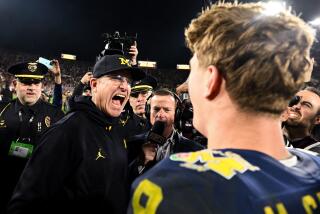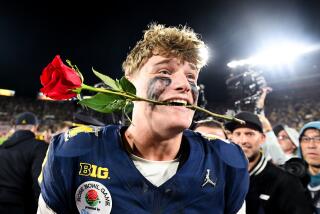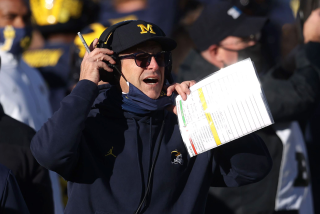Bo Schembechler, 77; Michigan football coach loved beating Ohio State
Bo Schembechler, an Ohio native who became the University of Michigan’s winningest football coach and loved nothing more than beating Woody Hayes and Ohio State, died Friday, the day before the Wolverines’ annual grudge battle with the Buckeyes. He was 77.
Schembechler, who had a history of heart trouble, collapsed after taping a TV show at a studio in Southfield, Mich., a Detroit suburb, and died at a hospital there. He had been retired from coaching since the 1990 Rose Bowl game.
“It’s fair to say that Bo wanted to live his life with vigor,” Dr. Kim Eagle, Schembechler’s physician, said in a statement reported by the Associated Press. “Ironically, he and I were going to see each other yesterday, but he wanted to address the team.”
Schembechler’s death shocked the football community in Ann Arbor and Columbus.
“We have lost a giant at Michigan and in college football,” Michigan Coach Lloyd Carr said in a statement. “There was never a greater ambassador for the University of Michigan, or college football, than Bo. Personally, I have lost a man I love.”
Ohio State Coach Jim Tressel said in a statement, “Bo Schembechler touched the lives of many people and made the game of football better in every way. He will always be a both a Buckeye and a Wolverine ... “
In his 21 seasons at Michigan, Schembechler compiled a 194-48-5 record -- in 26 seasons as a head coach, his record was 234-65-8 -- won or tied for 13 Big Ten championships and went to 17 postseason bowl games.
To his dismay, his Wolverines won only five of those games, going 2-8 in Rose Bowl appearances.
And, surprising to even hard-core followers of college football, Michigan, under Schembechler, never won a national championship.
Not that it mattered much to Schembechler.
“If you think my career has been a failure because I have never won a national title, you have another think coming,” he said a few weeks before losing, 17-10, to USC in that ’90 Rose Bowl.
“I have never played a game for the national title. Our goals always have been to win the Big Ten title and the Rose Bowl. If we do that, then we consider it a successful season.”
Said Wayne Duke, a former Big Ten commissioner: “What an unbelievable tragedy that Bo’s passing comes on the eve of the very game on which he had such an incredible impact over the years. Bo played a vital role in not only the success of Big Ten football, but collegiate athletics as a whole.”
A moment of silence will be observed before today’s game at Columbus, Ohio, the 103rd in the series. Ohio State is ranked No. 1 in the nation, Michigan No. 2. The teams have been playing each other since 1897, but they’ve never before been ranked first and second at their meeting, and for the first time since 1973 they have perfect records, each 11-0.
At stake are an undefeated season, the Big Ten title and a shot at the Bowl Championship Series national championship game Jan. 8.
“I love this time of year,” Schembechler said the other day. “I love to follow college football.”
He probably wouldn’t have loved it nearly as much had it not been for Hayes, his coach and mentor. In his autobiography “Bo,” written with Mitch Albom, Schembechler said, “There was plenty to criticize about Woody Hayes. His methods were tough, his temper was, at times, unforgivable. And, unless you knew him or played for him, it is hard to explain why you liked being around the guy. But you didn’t just like it, you loved it. He was simply fascinating.”
According to Steve Snapp, Ohio State’s longtime sports information director, Schembechler, who played for Hayes at Miami of Ohio and worked for him at Ohio State, was a carbon copy of the obstreperous Buckeye coach.
“He was just like the old man,” Snapp said. “He was a disciple.”
Snapp said Schembechler and Hayes frequently played handball together. Bo was better, but that didn’t matter.
“Woody wouldn’t let him leave until he won a game,” Snapp said.
Schembechler, though, won the game that mattered, possibly the biggest victory of his coaching career.
In 1969, his first year at Michigan, he was charged with bringing the Wolverine program back from mediocrity. The year before, Ohio State had won the national championship, trouncing Michigan, 50-14, along the way. Worse, Hayes rubbed it in by going for a two-point conversion after the Buckeyes’ last touchdown.
Schembechler, making immediate impact, had his team at 7-2 when Ohio State arrived in Ann Arbor in ‘69, carrying a 22-game winning streak, a No. 1 ranking and five first-team All-Americans.
The Wolverines beat the 17-point favorite Buckeyes, 24-12, winning the Big Ten title and Schembechler’s first Rose Bowl bid. Michigan was a national power once again.
After that game, Schembechler and Hayes engaged in a fierce “Ten Year War,” Schembechler holding a 5-4-1 advantage when Hayes was forced to retire after sucker-punching a Clemson player during the 1978 Gator Bowl. In 21 games against the Buckeyes, Schembechler’s Wolverines went 11-9-1.
It was before that first Rose Bowl, though, that Schembechler’s heart problems became apparent. He suffered a heart attack and had to miss the game, a 10-3 loss to USC. He had another heart attack in 1987. He eventually underwent two bypass operations and, after becoming ill during a TV taping last month, had a pacemaker implanted.
In his book, published in 1989, Schembechler mused, “Will I die from a heart attack? I’ve pretty much accepted that. I’ll probably go through another episode before I’m finished here on Earth.”
Glenn E. Schembechler Jr. -- he became Bo when his younger sister had trouble saying “brother” -- was born in Barberton, Ohio, the son of the town’s fire chief.
A good high school athlete, he attended Miami of Ohio, where he played football under the legendary Sid Gillman, then for Hayes after Gillman had moved on.
Despite the player-coach relationship, he and Hayes bonded. When Hayes moved on to Ohio State, Schembechler went with him as a graduate assistant working toward a master’s degree.
Schembechler later coached under Ara Parseghian at Northwestern, returned to Ohio State as an assistant -- again under Hayes -- then went back to Miami, where he was head coach for five seasons before moving on to Michigan, where he served without ever signing a contract.
Recalled longtime broadcaster Keith Jackson: “When Bo got the job at Michigan, he came home and told [his wife] Millie about it. She asked, ‘What’s it going to pay?’ He said, ‘I forgot to ask.’ ”
Schembechler spent his last two years at Michigan as both coach and athletic director. He made his athletic directorship notable in March 1989 when basketball Coach Bill Frieder accepted a job at Arizona State, giving 21 days’ notice before Michigan was to play in the NCAA tournament.
“A Michigan man will coach Michigan, not an Arizona State man,” an angry Schembechler said, hastening Frieder on his way and appointing assistant Steve Fisher to coach in the tournament. Michigan went on to win the national championship.
A year later, Schembechler resigned at Michigan to become president of the Detroit Tigers. He worked hard, but his football touch didn’t carry over to baseball, whose fans remember him most for firing Ernie Harwell, the beloved longtime broadcaster of Tigers games. Harwell was rehired two years later, after Schembechler himself had been fired.
That firing occurred in August 1992, 13 days before his wife died of cancer. Schembechler is survived by his second wife, Cathy.
Times staff writers Chris Dufresne and Larry Stewart and the Associated Press contributed to this report.
More to Read
Go beyond the scoreboard
Get the latest on L.A.'s teams in the daily Sports Report newsletter.
You may occasionally receive promotional content from the Los Angeles Times.










